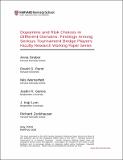| dc.contributor.author | Zeckhauser, Richard Jay | |
| dc.contributor.author | Rand, David Gertler | |
| dc.contributor.author | Wernerfelt, Nils Christian | |
| dc.contributor.author | Garcia, Justin | |
| dc.contributor.author | Lum, Koji | |
| dc.contributor.author | Dreber-Almenberg, Anna | |
| dc.date.accessioned | 2010-08-25T20:42:18Z | |
| dc.date.issued | 2010 | |
| dc.identifier.citation | Anna, Dreber, David G. Rand, Nils Wernerfelt, Justin R. Garcia, J. Koji Lum, and Richard Zeckhauser. "Dopamine and Risk Choices in Different Domains: Findings Among Serious Tournament Bridge Players." HKS Faculty Research Working Paper Series RWP10-034, July 2010. | en_US |
| dc.identifier.uri | http://nrs.harvard.edu/urn-3:HUL.InstRepos:4405460 | |
| dc.description.abstract | Individuals differ significantly in their willingness to take risks, partly due to genetic differences. We explore how risk taking behavior correlates with different versions of the dopamine receptor D4 gene (DRD4). We focus on risk taking in the card game contract bridge, and economic risk taking as proxied by a financial gamble. We also explore self-reported general risk taking, and self-reported behavior in risk-related activities. Our participants are serious tournament bridge players, which gives them substantial experience in risk taking. We find some evidence that men with a 7-repeat allele (7R+) of DRD4 take more overall risk in bridge than individuals without this allele (7R-), and strong evidence that 7R+ men take more economic risk in an investment game. Interestingly, these relationships are not found in the women in our study. Although the number of 7R+ women in our sample is low, our results may reflect a gender difference in how the 7R+ genotype affects behavior. Bridge masterpoints measure past success, thus reflecting playing skill and experience. We show that masterpoint level modulates the effect of the DRD4 gene in men in a highly important manner. We find that higher ranked 7R+ men take significantly more good risks and significantly fewer bad risks than other men, whereas the opposite is found for less-expert 7R+ men. This is the first study to distinguish between advantageous and disadvantageous risk taking. We identify a strong interaction among desirable risk taking behavior, measured success, and genetic variation. Considering other risk measures, we find no difference between 7R+ and 7R- individuals in general risk taking or in any of a number of other risk-related activities. Our results indicate that the dopamine system plays an important role in explaining individual differences in risk taking in bridge and economic risk taking among men. Little relationship is found in other activities involving risk or among women. | en_US |
| dc.language.iso | en_US | en_US |
| dc.relation.isversionof | http://web.hks.harvard.edu/publications/workingpapers/citation.aspx?PubId=7371 | en_US |
| dash.license | LAA | |
| dc.subject | MBG - Markets, Business & Government | en_US |
| dc.subject | MLD - Management, Leadership, and Decision Sciences | en_US |
| dc.subject | Decision Sciences | en_US |
| dc.subject | Brain Mechanisms | en_US |
| dc.subject | Decision Making | en_US |
| dc.subject | Individual Decisions | en_US |
| dc.subject | Biomarkers | en_US |
| dc.subject | Judgement | en_US |
| dc.subject | Race, Ethnicity, Gender, and Class | en_US |
| dc.title | Dopamine and Risk Choices in Different Domains: Findings Among Series Tournament Bridge Players | en_US |
| dc.type | Research Paper or Report | en_US |
| dc.description.version | Author's Original | en_US |
| dc.relation.journal | HKS Faculty Research Working Paper Series | en_US |
| dash.depositing.author | Zeckhauser, Richard Jay | |
| dc.date.available | 2010-08-25T20:42:18Z | |
| dash.authorsordered | false | |
| dash.contributor.affiliated | Dreber-Almenberg, Anna | |
| dash.contributor.affiliated | Wernerfelt, Nils Christian | |
| dash.contributor.affiliated | Zeckhauser, Richard | |
| dash.contributor.affiliated | Rand, David Gertler | |


